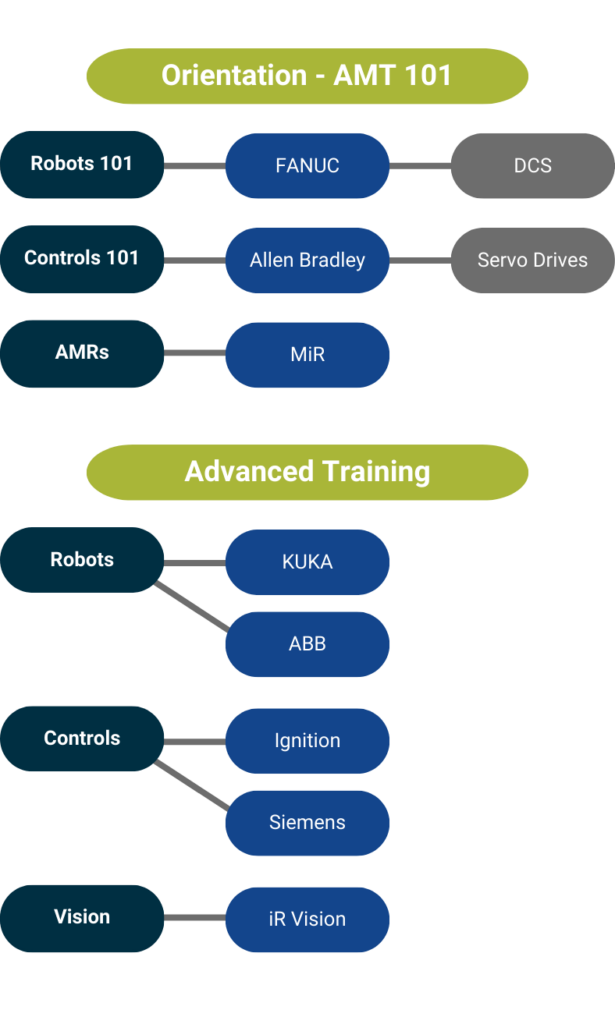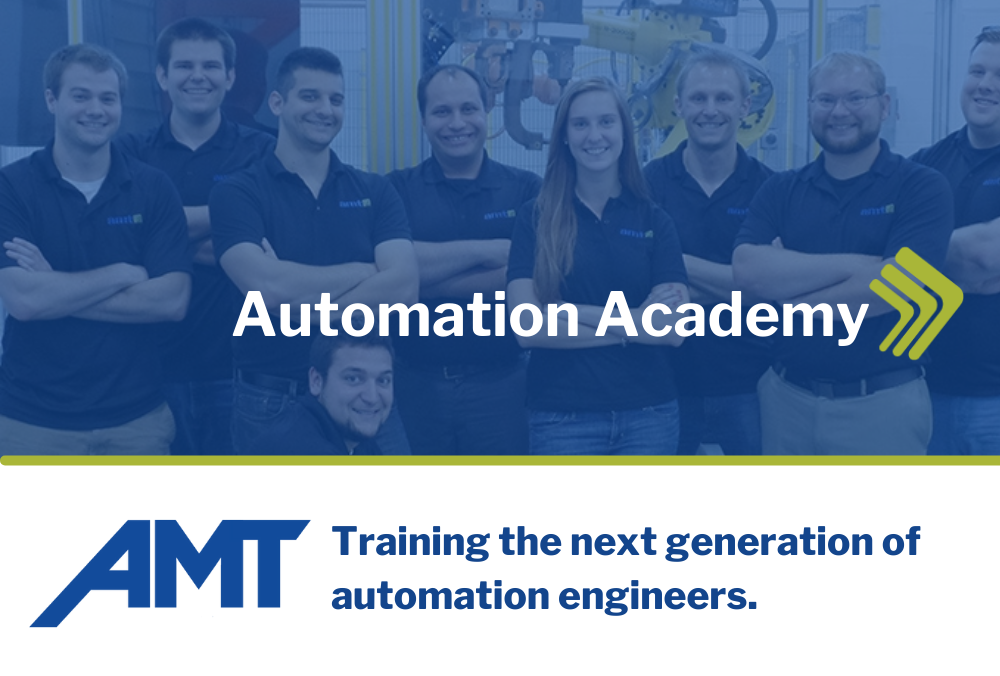Applied Manufacturing Technologies’ Automation Academy is the reason our engineers can integrate seamlessly into our customers’ teams and operations. AMT career development begins with the Automation Academy’s culture of high performance and continuous learning. Your career will jump start in our 6,000-square-foot automation lab supported by dedicated engineering specialists focused on developing your skills. Training and mentoring continues throughout your career. At AMT you’ll quickly go from being the newbie to the mentor for the next generation. We match each new employee with an AMT mentor and set up a custom training plan to accelerate and strengthen their skill set, which results in a team rich in technical and practical knowledge.
What it’s like to work with an AMT-trained engineer
This quote from a senior controls engineer says it all about the kind of talent our Academy produces.

Between assignments, our seasoned engineers also use the Automation Academy onsite training lab, latest technology, and module-based curriculum materials to keep their skills sharp and their knowledge current. We don’t do “down time” at AMT – we’re always improving, mentoring, learning and growing!
AMT Automation Academy Boosts Team Productivity and Project Success
We do this by:
- Partnering with leading technological colleges and universities to nurture emerging engineers wishing to supplement their education with real-world work experience.
- Engaging with local robotics clubs to guide interested and talented high school students towards automation careers.
- Recruiting experienced technical professionals who can transition their experience and knowledge into the AMT engineering team.
- Ensuring all of our engineers have been pre-qualified on all of our customer standards and certifications, for example: GCCH, GCCS, and GRS for General Motors. In some cases, we even teach the curriculum for industry.

Commitment
AMT is committed to providing Automation Academy students with the essential skills required in the automation industry. The Academy lays the groundwork for students to advance their careers in automation, aligning with the company’s mission.
- Technical Training
- Hands-on labs
- Instructor-led classes
- One-on-one mentoring
- Online classes
- Troubleshooting techniques
- Capstone project
- Self-study for GRS and GCCS certification
- Soft Skills Training
- Communication
- Conflict resolution
- Sales
- Graduation
- Capstone presentation
- Certificate of completion
- GRS and GCCS exams
- Online recognition
- Ongoing
- 24/7 access to the AMT team and proprietary resources
Why AMT’s Automation Academy?
We believe the most effective learning comes from working through your own case study. As an Automation Academy student, you’ll dive into active learning, applying newly-acquired skills and techniques directly to real systems. Our approach combines proven classroom theory with hands-on application, offering the best of both worlds.
Our instructors are seasoned automation engineers with expertise in electrical, mechanical, and software engineering, and a passion for teaching. Furthermore, the Automation Academy draws from the vast experience of more than 130 automation engineers at AMT, who contribute as guest instructors, personal mentors, on-the-job trainers, and more.
Candidate Qualifications
We take a holistic approach to selecting candidates for the Academy based on years of experience building careers in automation. Technical aptitude is important but not the deciding factor.
Requirements:
- Exemplify the AMT RISE Core Values
- R – Respect for the individual
- I – Integrity
- S – Supports the team
- E – Excellence in reputation
- Strong desire to learn
- Listens well, takes notes, asks questions
- Demonstrated solid work ethic (whether from a summer job at a fast food restaurant or an engineering internship)
- Willingness and ability to travel – Assignments at client sites may require extended stays
Course Calendar
The course calendar spans nine weeks, with some flexibility to accommodate trainer availability.
Week 1 covers essential topics such as company onboarding, safety training, and an overview of the industry. This week also introduces key technical concepts like AMT 101, VMware training, and an explanation of engineering tools, including RSLogix, RSLinx, FactoryTalk, and lockout tagout, electrical safe work practices.
Weeks 2 to 5 (not consecutive) focus on instructor assisted PLC training, featuring more than 50 labs to reinforce learning through real-world applications. The training includes modules covering controls basics, PLC and HMI concepts, hardware and software design, communication setup, print reading, ladder logic programming, device control, HMI design, and professional topics such as communication, troubleshooting, sales, and conflict resolution.
Week 6 begins with a lecture to familiarize students with AMRs and related technology. This is followed by an activity in which students drive the AMRs around to set up their maps and positions. As the week progresses, students create their missions by augmenting their maps, then focus on communicating between a PLC and the AMRs using Ignition.
In Week 7, students participate in instructor-led robot programming training, divided into modules that explore robot basics, motion, I/O setup and troubleshooting, program instructions, and advanced techniques. This comprehensive training ensures students are well versed in robotic programming.
Week 8 marks the beginning of the Capstone project, along with self-study for GRS and GCCS and subsequent testing.
Week 9 offers extra training tailored to the students’ interests or initial project expectations, including topics like motion control, networking, advanced HMI design, robot programming, logic-specific applications, techniques, advanced instructions, and the completion of the Capstone project.
The course concludes with a graduation ceremony, featuring a Capstone project presentation to the leadership team.
To learn more, check out these articles: Automation Academy graduate Lawrence Nixon Mentors New Hires and Jason Markesino and AMT’s Automation Academy Featured in Robotics Tomorrow.
